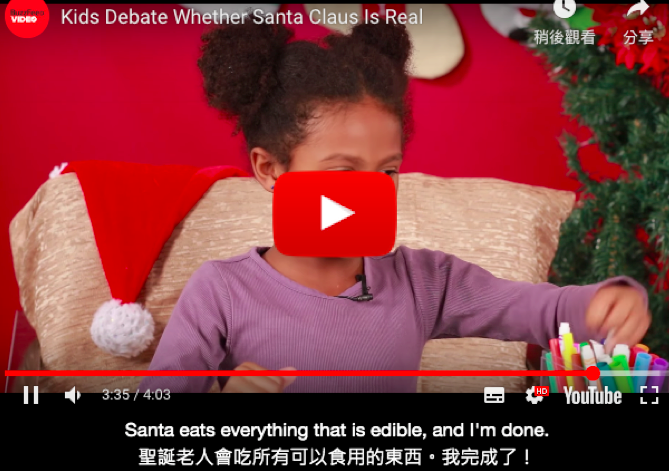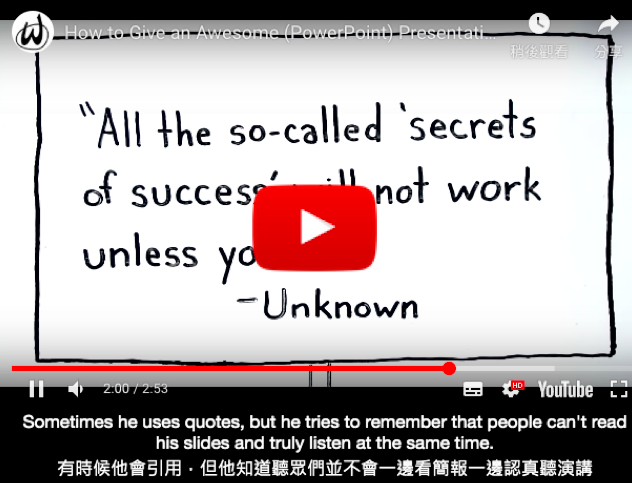工作佔據人生 1/3 的時間,而睡覺佔了另外的 1/3,
等於你有過半清醒的時間都在工作!
花這麼多時間在工作上,
是不是該好好學一下職場英文呢?
以下是幾個最常出錯的工作英文用語,快來看看吧!
我完成了 I’m done
(X) I’m over.
Over 可以翻作「結束,完畢」,但如果說 I’m over.,聽起來會像是說「我結束了,我完蛋了」。所以說,如果要表達自己已經把工作完成時,要用 I’m done. 會比較貼切。Done 在這邊是形容詞,表示事情完成了或是某人做完某件事情,主詞可以是人或事。若想明確地說出自己完成了哪項工作,也可以用 I finished ____. 或是 I’m done with ____. 這樣的句型。
Richard: Gregg, let me know if you need any help with that report. I know you’ve been under a lot of stress lately.
Richard:Gregg,如果你報告需要幫忙的話跟我說,我知道你最近壓力很大。
Gregg: No need; I’m already done!
Gregg:不需要,我已經完成了!
Richard: Really? Wow! Can I have a look?
Richard:真的嗎?哇!我可以看看嗎?
Gregg: Sure! I’ve already made bound copies.
Gregg:好呀,我已經列印成冊了。
Richard: Gregg, it’s almost 300 pages! How did you get it done so fast?
Richard:Gregg,這快 300 頁了耶!你怎麼這麼快弄好的?
Gregg: I’ve been doing a lot of overtime.
Gregg:我加了很多班。
Richard: (pages through the report) But Gregg, most of these pages are blank!
Richard:(翻閱報告) 但是 Gregg,多數頁面都是空白的耶!
真的有聖誕老人嗎?聽聽看孩子們的說法 (Kids Debate Whether Santa Claus Is Real)

工作量很大 heavy workload
(X) big loading
把「大」直接翻作 big 是非英文母語者很常見的問題,就像「大雨」很常聽到有人說成 big rain 。但當事物是由「量」來計算時,形容詞應該選用 heavy 而非 big。Heavy 常見搭配用法包括 heavy rain(大雨)、heavy duty(重責)以及這裡談到的 heavy workload(很大的工作量),動詞可以搭配 carry(承擔)或是 have。
Susie: And so it was just 300 pages of nothing?
Susie:所以 300 頁什麼都沒有?
Richard: Well… there was a title page. And he’d had the reports professionally bound. But everything else was blank.
Richard:這個嘛… 有書名頁。而且他還專業地把把報告集成冊了,但其它地方都是空白的。
Susie: I know he’s been carrying a really heavy workload recently.
Susie:我知道他最近工作量很大。
Richard: Exactly. I think the workload has finally pushed him over the edge. I’m a bit concerned about his mental state.
Richard:沒錯,我想工作量最終還是把他逼到絕境了。我有點擔心他的精神狀態。
Susie: Now that you mention it, last week, I did see him using a banana as a cell phone. I’ll go speak to him.
Susie:既然你提到了,我上週的確是看到把香蕉手機用。我會去跟他談談。
工作量太大沒時間背單字?
VoiceTube Hero 讓你事半功倍 >>> http://voicetu.be/3fxywh

降低成本 lower cost(s)
(X) cost down
開會中常常聽到老闆說要 cost down ,但其實這個說法是不對的。Cost down 是中文的直譯,並不是道地的英文用法喔!如果提到「降低成本」,正確的說法為 lower cost(s),lower 在這邊是當動詞用,表示「降低,減少」。
Richard: Well? Did you talk to him?
Richard:怎麼樣?你跟他談過了嗎?
Susie: I think this is quite serious. Gregg seems to have gone completely insane.
Susie:我覺得這蠻嚴重的,Gregg 似乎已經徹底瘋了。
Richard: What happened?
Richard:發生什麼事了?
Susie: Yesterday I dropped by his cubicle to try and have a chat about how he’s doing.
Susie:昨天我經過他的座位,嘗試跟他聊了一下他的近況。
Richard: And?
Richard:然後呢?
Susie: He wanted to show me his “secret plans to lower costs in the company’s supply chain”, but his PowerPoint was just full of drawings he’d done of cats.
Susie:他想要給我看他「降低公司供應鏈成本的秘密計畫」,但他的 PPT 卻全都是他畫的貓。
撥打我的手機 call me on my cell (phone)
(X) You can call my cell phone.
這句話也是因為直翻而產生的錯誤,講出來會讓外國人一頭霧水的!Call my cell phone 意思會變成「打電話給『我的手機』」,而不是「打電話給『我』」,所以務必要記得加上介係詞 on 再接 my cell (phone),才會是「你可以打電話到我的手機找我」的意思。
Richard: Gregg? Have you got five minutes?
Richard:Gregg,你有 5 分鐘的時間嗎?
Gregg: Sorry, Richard, I’m just working on a plan to lower costs in the company’s supply chain.
Gregg:不好意思,Richard,我正在處理降低公司供應鏈成本的計畫。
Richard: Gregg… I can see that you’re just drawing pictures of cats.
Richard:Gregg… 我可以看到你只是在畫貓咪的圖案。
Gregg: Sorry, Richard, if you need me, you can always call me on my cell phone. Oh, looks like I’m getting a call right now! Hello?
Gregg:抱歉,Richard,如果你需要我的話,可以隨時打我手機。喔,看來我現在有電話進來了!喂?
Richard: Gregg, that’s a banana! Let me speak to the boss about getting you a holiday.
Richard:Gregg,那是根香蕉!讓我跟老闆談談,讓你放個假吧。
請再說一次 What was that? / I’m sorry? / Pardon?
(X) Please repeat again.
別人說的話沒有在第一次聽清楚是人之常情,這個時候再請對方再說一遍就好。然而常聽到的 Please repeat again. 其實是不自然的說法, 而且 repeat 本身就有重複的意思了,所以後面就不用多此一舉再加一個 again 。道地的說法可以用 (I beg your) Pardon?、I’m sorry?、What was that?,或是直接說 Can you please repeat that?,記得句尾語調要上揚才能表示疑問。
Richard: I was wondering if we could have a chat about Gregg…
Richard:我在想我們是不是能聊聊 Gregg…
Theresa: Gregg? No need to ask, I’ve already given him a promotion and a raise.
Theresa:Gregg 嗎?不用問了,我已經幫他升職加薪了。
Richard: Wait… what was that?
Richard:等等… 你說什麼?
Theresa: Gregg is showing the exact type of innovative thinking that we need to become number one in the industry.
Theresa:Gregg 展現了我們成為產業龍頭所需要的創新思考精神。
Richard: I beg your pardon?
Richard:你說什麼?
Theresa: I’ve asked him to give a presentation to the Board of Directors tomorrow on his secret plan to lower costs in our supply chain.
Theresa:我已經請他明天針對他降低產業鏈成本的計畫項董事會提交報告了。
看影片練語感,把道地的英文用語學起來!
用 VoiceTube Hero 看影片學英文 >>> http://voicetu.be/3fxywh

投影片 slide
(X) PPT
想必大家對 PPT 這個說詞都不陌生,不管上學還是上班,PPT 都是報告的必備工具。但注意了!PPT 其實是台灣人對 PowerPoint 這個軟體獨有的簡稱,在英語世界裡並沒有這樣的說法。PowerPoint 中的投影片正確說法是 slide ,多張投影片則加上 -s 變成 slides,而投影片報告則是 PowerPoint presentation,不要再說錯啦!
Susie: Did you speak to Theresa?
Susie:你和 Theresa 聊過了嗎?
Richard: She’s given Gregg his own office and made him an executive.
Richard:她給了 Gregg 個人辦公室,還把他升為高階主管。
Susie: I’m sorry?
Susie:你說什麼?
Richard: Theresa is convinced that Gregg is some sort of genius. She’s asked him to show his PowerPoint presentation to the Board tomorrow.
Richard:Theresa 堅信 Gregg 是某種天才,還請他明天向董事會展示他的 PPT!
Susie: What? The one with all the slides of cat drawings?
Susie:什麼?那個全都是貓咪投影片的報告?
謝謝聆聽 Thanks for listening. / Thank you for listening.
(X) Thank you for your listening.
從小到大聽到的 Thank you for your listening. 其實是中式英文喔!事實上,your 後面只能接上「事物」,不能接上「動作」,所以如果表達「感謝『你的』聆聽」,只要說 Thanks for listening. 或 Thank you for listening. 就可以了。同理,「感謝你的收看」則可以說 Thanks for watching. 。
Gregg: So, in conclusion, I want you to ask yourself this: Can rabbits even speak Italian?
Gregg:所以總結來說,我想請你們問自己一個問題:兔子會說義大利文嗎?
Board member: I’m sorry, what was that?
董事會成員:你說什麼?
Gregg: Yes. Thanks for listening.
Gregg:好的,謝謝聆聽。
Board member: Oh… I think I see what you’re saying. We need to speak with our customers, not at them.
董事會成員:喔… 我懂你在說什麼了。我們要和我們的客戶對話,不是向著他們說話。
Gregg: (winks) Thank you for listening.
Gregg:(眨眼)謝謝各位聆聽。
Board member: Theresa, this is one smart man. You do whatever you can to keep him at the company.
董事會成員:Theresa,這小子真聰明,務必要盡一切可能把他留在公司。
報告要怎麼說得很流利?
快用 VoiceTube Hero 練口說 >>> http://voicetu.be/3fxywh

我的意思是 _____ What I mean is, _____.
(X) My meaning is _____.
中文說「我的意思」,很多人會直翻成 my meaning。這句話文法上沒有錯,meaning 是名詞,確實可以表示「意思」,但是不會說 my meaning、your meaning,道地的說法是 what I mean。所以當你要解釋自己所說的話時,可以用 what I mean is, 後面加上一個子句,mean 在這邊則是動詞,表示「意思是」。
Richard: So, after 20 minutes of nonsense and slides of cats, he just winked and said, “Thanks for listening.”
Richard:結果經過 20 分鐘的胡言亂語和一堆貓咪投影片後,他只是眨眼然後說「謝謝聆聽」。
Susie: And what did the Board think?
Susie:那董事會覺得如何?
Richard: They loved it! They gave him a standing ovation! One of them called him “the next Steve Jobs”.
Richard:他們愛死了!還起立鼓掌!其中一個人還稱他為「下一個賈伯斯」。
Susie: Maybe this is all deliberate? What I mean is, he knows it’s the exact kind of “innovative” bullshit that the people who run this company love.
Susie:或許這全都是故意的?我的意思是,他知道經營這間公司的人就愛這種「創新」的垃圾。
Richard: Yes. And by tricking them into thinking he’s a genius, he can get rid of his heavy workload.
Richard:沒錯,而且只要騙他們相信自己是天才,他就可以擺脫沉重的工作量了。
Susie: They do say there’s a fine line between genius and insanity.
Susie:人們的確是說到天才和瘋子只有一線之隔。
正確的用法都學起來了嗎?
會了這些英文用語,下次在工作場合需要用到英文時除了不會再出糗 ,同事也會對你刮目相看!
VoiceTube Hero 讓你自學英文也能輕鬆進步,任何程度都適用!
免費體驗課程 >>> https://herov3.page.link/rK6c

文/ VoiceTube 看影片學英語
圖/ Pixabay, CC licensed
